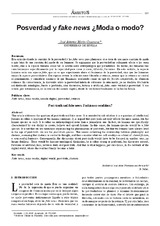Posverdad y fake news ¿Moda o modo?
Post-truth and fake news. Fashion or condition?
Autor
Marín-Casanova, José Antonio
Editor
Asociación de Estudios de Ciencias Sociales y HumanidadesFecha
2019Materia
Fake newsMass media
Mundo digital
Posverdad
Retórica
Digital world
Post-truth
Rhetoric
METS:
Mostrar el registro METSPREMIS:
Mostrar el registro PREMISMetadatos
Mostrar el registro completo del ítemResumen
Este artículo aborda la cuestión de la posverdad y las fake news para plantearse si se trata de una mera cuestión de moda o más bien de una cuestión del modo de ser humano. Se argumenta que la posverdad no solamente afecta a los mass media, sino a la especie humana como tal: es asunto antes antropológico que periodístico. De hecho, los humanos nos caracterizamos específicamente por la capacidad para crear y creer, difundir, ficciones. En este sentido, la especie humana sería una especie fake, que no es que experimente ahora el fenómeno de la posverdad, sino que los humanos somos la especie posverdadera. Eso supone revisar la relación entre filosofía y retórica, asumir que lo retórico es central al pensamiento, y considerar entonces lo que llamamos «realidad» como un tipo de ficción compartida, de «fantasía exitosa». En consecuencia, la discusión sobre la posverdad habría de enfocarse de otro modo, ya no dualista. No habría así distinción ontológica, fuerte o profunda, sino discursiva, ficticia o artificial, fake, entre verdad y posverdad. Y eso ocurre, por antonomasia, en la retícula del mundo digital, donde lo verdadero finalmente se ha hecho fábula. This article addresses the question of post-truth and fake news. It is intended to ask whether it is a question of intelectual fashion or rather a question of the human condition. It is argued that post-truth not only affects the mass media, but the human species as such. It is rather an anthropological issue than a journalistic one. In fact, we humans are specifically characterized by our ability to create, believe and spread fictions. In this sense, the human species would be a fake species. It is not that we are nowadays experiencing the phenomenon of post-truth, but that we humans have always lived in the age of post-truth: we are the post-truth species. This means reviewing the relationship between philosophy and rhetoric, assuming that rhetoric is central to thought, and then consider what we call «reality» as a kind of shared fiction, a «successful fantasy». Consequently, the discussion about post-truth would have to be focused in another way, no longer dualistic. There would be then no ontological distinction, be it either strong or profound, but discursive instead, fictitious or artificial, fake, between truth and post-truth. And that is what happens, par excellence, in the network of the digital world, where the real has finally become a fable.

